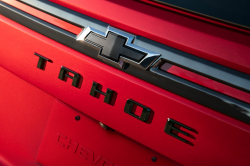— A GM brake booster lawsuit alleges the following vehicles are prone to a sudden loss of vacuum in the boosters that cause the brake pedals to become too hard to depress.
- 2015 to present Cadillac Escalade
- 2014 to present Chevrolet Silverado
- 2015 to present Chevrolet Suburban
- 2015 to present Chevrolet Tahoe
- 2014 to present GMC Sierra
- 2015 to present GMC Yukon/Yukon XL
The GM brake booster class action lawsuit alleges drivers must stand on the brake pedals just to get the vehicles to slow down, compromising stopping distances. The plaintiff says General Motors has known about the brake booster problems since at least 2014 but chose to conceal the defects.
Plaintiff Amber Quitno says she purchased a new 2015 Chevrolet Tahoe in September 2015 from an Illinois GM dealership and allegedly spent about 20 minutes "speaking to the sales representative specifically about the allegation made against GM concerning its concealment" of a "steering defect."
The sales rep allegedly told her the Tahoe was safe and if any safety-related defects existed, GM would disclose that important fact.
Quitno says the Tahoe suffered brake problems in 2018 when she tried to apply the brakes as the wheels were turned while backing out of her driveway. The plaintiff says the brakes felt hard and wouldn't slow down the vehicle, sending the Tahoe into another car parked near her driveway.
The Tahoe had a broken tail light, bent bumper and a bent side fender. She also alleges she paid $50 to the owner of the other car.
A few months later the Tahoe allegedly suffered brake failure as she was backing out of a parking space, and the plaintiff says the vehicle stopped only when she stood on the brake pedal with all her weight. She says she shifted into PARK, turned off the engine then restarted, causing her brakes to return to normal.
However, the plaintiff says she tried backing out again but the brakes failed again. Quitno says the only way she got the Tahoe to stop was to once again stand on the brake pedal. She says the brakes started working again and allowed her to get the vehicle into her driveway.
The next day she tried to take the Tahoe to a dealership, but the brakes failed again as she backed out of the driveway. The plaintiff says she called the dealer and was told the warranty had expired four days before, but an employee did arrive and picked up the Tahoe to have it checked out.
Dealer technicians said they couldn't find a problem, until the plaintiff allegedly asked them to check the brake vacuum.
According to the verification sheet, "the brake pressure is -9 sitting and -3 on. The dealership advised Plaintiff that the brake pressure should be -13."
A replacement part was installed at a cost of about $400, but the plaintiff says she doesn't think the new part will fix the braking problems.
The automaker has issued technical service bulletins (TSBs) concerning the braking systems in 2015-2016 Cadillac Escalades, 2014-2016 Chevrolet Silverado 1500s, 2015-2016 Chevrolet Suburbans, 2015-2016 Chevrolet Tahoes, 2014-2016 GMC Sierra 1500s and 2015-2016 Yukons.
GM issued bulletin PIT5361B in February 2015 concerning customers who complained about hard brake pedals. Dealerships were told fluid may be found in the brake booster and/or booster vacuum line.
Technicians were told to replace the brake vacuum pump, vacuum line between the booster and the pump, brake booster and the master cylinder.
General Motors also issued a recall in September 2019 for more than 3.4 million SUVs and trucks after compaints about hard brake pedals that caused crashes and injuries.
The GM brake booster lawsuit was filed in the U.S. District Court for the Northern District of Illinois, Western Division: Quitno, et al., v. General Motors, LLC.
The plaintiff is represented by Stephan Zouras, LLP, and Cuneo Gilbert & LaDuca, LLP.
CarComplaints.com has complaints from drivers of the GM vehicles.
Read what drivers tell CarComplaints.com about the GM vehicles.

